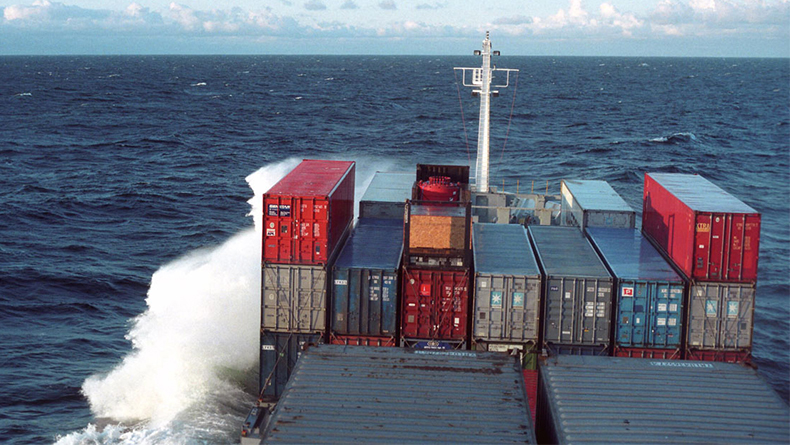From the News Desk: Earnings results reveal early impact of coronavirus
First-quarter figures offer a taste of the effects of the Covid-19 crisis, but the worst is yet to come
Falling revenues, reduced scrubber orders and lower throughput at ports offer early indications of the impact coronavirus is having on shipping
STARTING in China, where the pandemic was mainly concentrated in the opening months of the year and the first country to lift lockdown restrictions, Cosco Shipping Ports — part of the China Cosco Shipping Corp conglomerate — reported an 11% drop in revenue for the first quarter of the year, while total throughput contracted by 4.4%
It was in Greater China that the company saw the biggest effect of the health crisis, with handling volume down 6.6% to 20.7m teu in the opening months. In comparison, the volume at its ports elsewhere around the world was up 3% to 6.8m teu year on year.
The company was clear in its business statement that it does not see the outbreak as a hindrance to its expansion plans and sees the declining valuation of terminal resources in other parts of the world as potential opportunities to expand its global network.
Orient Overseas Container Lines, also part of the state-owned CSP group, reported “better than expected” results for the opening three months of the year, with a 5.5% rise in total revenue to $1.5bn and average revenue per teu up by 6.6%. The total volume of liftings fell by just 0.4%, while its overall load factor was 1.1% higher than the same period last year.
Alphaliner principal consultant Tan Hua Joo put the improvement, led by a 2% increase in liftings on both transpacific and Asia-Europe trades, down to the fact that blanked sailings, which have been rising in recent weeks, were already planned due to the Chinese New Year holidays and therefore did not reflect the full impact of the virus outbreak.
However, the impact of the void sailings is likely to be felt by the firm in the next quarter, Mr Tan said.
Falling oil prices
Chinese ship repairers, meanwhile, are feeling the effects of the coronavirus-related price crash for oil and plunging bunker costs with many shipowners, especially owners of large containerships, said to have changed their minds on scrubber fittings in recent weeks.
Compared with traditional ship repairing projects, installations of scrubbers, as well as ballast water treatment systems, deliver a much greater contract value, especially after prices were pushed up by the earlier surge in demand resulting from the new International Maritime Organization environmental rules.
Yard sources in China told Lloyd’s List that the two devices could make up 60% of the revenue for large state-owned repairers, such as Cosco Shipping Heavy Industries (Guangdong), last year and 30%-40% for their smaller, privately run Chinese competitors.
The sales bonanza and the resulting slot shortage was also used as the reason for inflating the conventional repairs, which further boosted yards’ income. However, such a boom is quickly going into reverse, even though yard workers, previously unable to get to work due to the lockdown restrictions, have returned.
Finnish smart tech business Wärtsilä also recently cited a weakened demand outlook for the engines and scrubbers that it provides to the shipping sector as one of the reasons for a drop in pre-tax profit for the first three months of 2020.
Chief executive Jaakko Eskola said measures taken to contain the spread of coronavirus had resulted in factories running at lower than usual capacity and in restrictions on travel, which will present challenges in accessing customer sites.
Similarly, Alfa Laval recently revealed that its scrubber order intake has fallen considerably amid the uncertainty brought about by the current situation.
The Swedish engineering group, which makes scrubbers, heat exchangers and BWTS, said general uncertainty around retrofit yard slot availability, the long-term availability and price of fuels, and freight rates contributed to lower demand for scrubber technologies, compared with the first quarter of last year.
It added that the underlying market sentiment was positive until the price of oil sharply contracted at the end of March.
One part of the industry that is benefiting in the short term from the oil price drop, however, is shipbroking, with demand for floating storage spiking in the past week.
As revealed by Lloyd’s List Intelligence last week, some 114 tankers, including 59 very large crude carriers, were deployed for floating storage in the week ending April 24 — the highest it has ever been in records going back to 2009.
Floating storage is likely to soar well above these volumes in coming weeks as tanks fill up shoreside and the contango in the oil price widens. Time charters for periods ranging from three months to 12 months have accelerated, with tankers expected to be used for storage leading into the northern hemisphere summer.
Seemingly backing up this assessment, Braemar Shipping Services last week withheld its dividend for the year to February 28 as it looks to protect liquidity but also reported a positive medium-term outlook for its shipbroking business.
Braemar said it has seen high activity and transactions in the tankers market driven by the oil glut. Longer-term chartering also increased, with the forward order book growing from $50m at the past year-end, February 29, to $52m at March 31.
Bleak outlook for containers
It is the box shipping sector that will likely feel the most pain from the pandemic, with Sea-Intelligence revealing in its latest analysis that, collectively, carriers could stand to lose $23.4bn in 2020 due to a steep fall in demand as the global economy suffers.
Credit rating agency Standard and Poor’s has also today downgraded its outlook for the future health of the three major listed European container carriers — Maersk, Hapag-Lloyd and CMA CGM. It said carriers are likely to see an earnings decline of 15%-20% this year compared with 2019.
Singapore-based carrier Ocean Network Express last week provided the first evidence of the impact of blanked sailings on carrier lifted volumes.
ONE’s transpacific liftings fell 6.7% in the three months to the end of March, providing an indication of what to expect from other carriers when they begin to publish first quarter of the year results from the beginning of next month.
The Alliance, of which ONE is a member, along with Hapag-Lloyd, Yang Ming and HMM, has been one of the more aggressive alliances in blanking voyages, removing a fifth of its transpacific capacity, a third of Asia-northern Europe capacity and 40% of Asia-Mediterranean capacity.
As Sea-Intelligence noted, as of mid-April there have been 435 sailings cancelled on several deepsea trade lanes, indicating a full year slide in demand of 7m teu.
The collapse in oil prices may be one silver lining for the carriers, according to the analyst. Not only will it provide for a much-needed cash injection, because of the natural time lag of any bunker oil price cost pass through mechanism, or baf, but it also presents a unique opportunity last seen when bunker prices dropped below $300 per ton in 2016: sailing south of Africa, to avoid the Suez Canal toll.
Nevertheless, ONE chief executive Jeremy Nixon said carriers should brace for “rough seas ahead” as the pandemic takes its toll on containerised freight volumes, while also stressing that it is important for trade to continue and for supply chains to remain intact during the crisis.
“Ships and containers must be able to trade freely with minimal port and inland restrictions to ensure supply lines of essential products and commodities do not freeze up, while humanity and our economies battle the coronavirus around the world,” he said.
Major ports around the world are already seeing below average loaded container volumes, such as Oakland in the United States and Rotterdam in the Netherlands to name but two from recent weeks.
One intriguing set of freight volume figures came from Sweden this week, a country that has largely side stepped extensive lockdown measures and kept its economy open as much as possible, which recorded fairly stable first quarter throughput numbers.
However, on closer inspection, the 8% increase in containers volume was largely due to a 10% year-on-year rise in exports in March, while on the import side there were lower volumes coming in from China and this was offset by “a rise in the import of empty containers needed to avert a shortage for the country’s export companies”, according to Gothenburg Port Authority’s chief executive Elvir Dzanic.
Mr Dzanic added that he expects to see freight numbers hit in the second quarter of the year, although it is too early to forecast the extent of the damage.
Last chance to register for our webinar
As highlighted above, the shipping industry is navigating through unprecedented economic dynamics and the uncertainty about what the future holds is growing.
At 2:30pm BST on April 29, Lloyd’s List will be hosting the first in its series of ‘Ask the Analysts’ webinars in which you can put a question on any aspect of the shipping industry to our team of editorial experts and Lloyd’s List Intelligence analysts.
The panel for the first session is as follows:
-
Richard Meade | Editor, Lloyd’s List
-
Christopher Palsson | Head of the Lloyd's List Intelligence Consulting team
-
Michelle Wiese Bockmann | Lloyd’s List Markets Editor
-
Anastassios Adamopoulos | Lloyd’s List Reporter
-
Janet Porter | Chair of the Lloyd’s List Editorial Board
-
Richard Clayton | Lloyd’s List Chief Correspondent
-
James Baker | Lloyd’s List Containers Editor
You can register to participate in the live session and submit questions in advance via the registration form or by selecting the image above. Access will be free to anyone who registers, and you will also be able to view previously recorded sessions on demand.




